It’s fair to say that opinions about HR are mixed. We all know incredible, dedicated HR professionals out there but there’s also an undercurrent of dissatisfaction with the way certain issues are handled.
So we set out to dig deeper and ask how human is HR? The short answer, not great. But there’s plenty of easy ways to make improvements that will benefit employees and businesses alike.
We surveyed 926 Americans and asked them:
- Their opinions on how well HR professionals do their job.
- About whether they’d seek HR’s advice about a range of problems at work.
- To tell us the most unusual situation they’ve had to report to HR.
Let’s begin.
HR, We Have a Problem
Some problems we encounter in the workplace are just plain annoying. Others are downright criminal. But how willing are we to report them to HR?
To answer that question, we created a list of scenarios and asked our respondents if they’d report them. As you'll see in our infographics, we divided the scenarios into three categories, criminal issues, coworker issues and personal issues. The response figure reveals the percentage who said no.
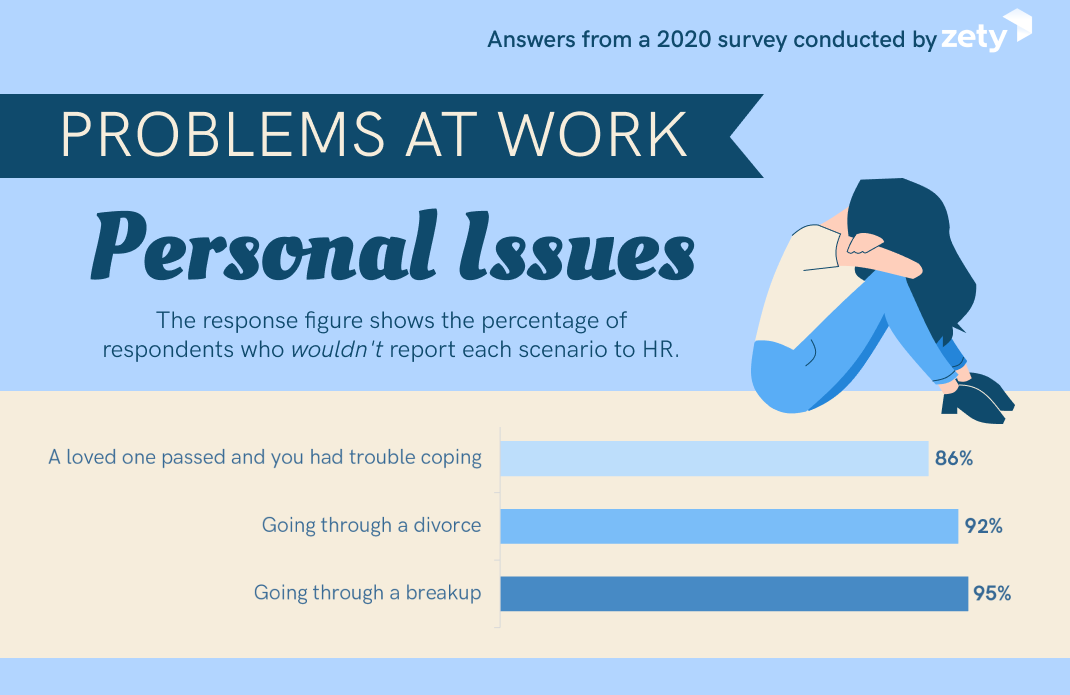
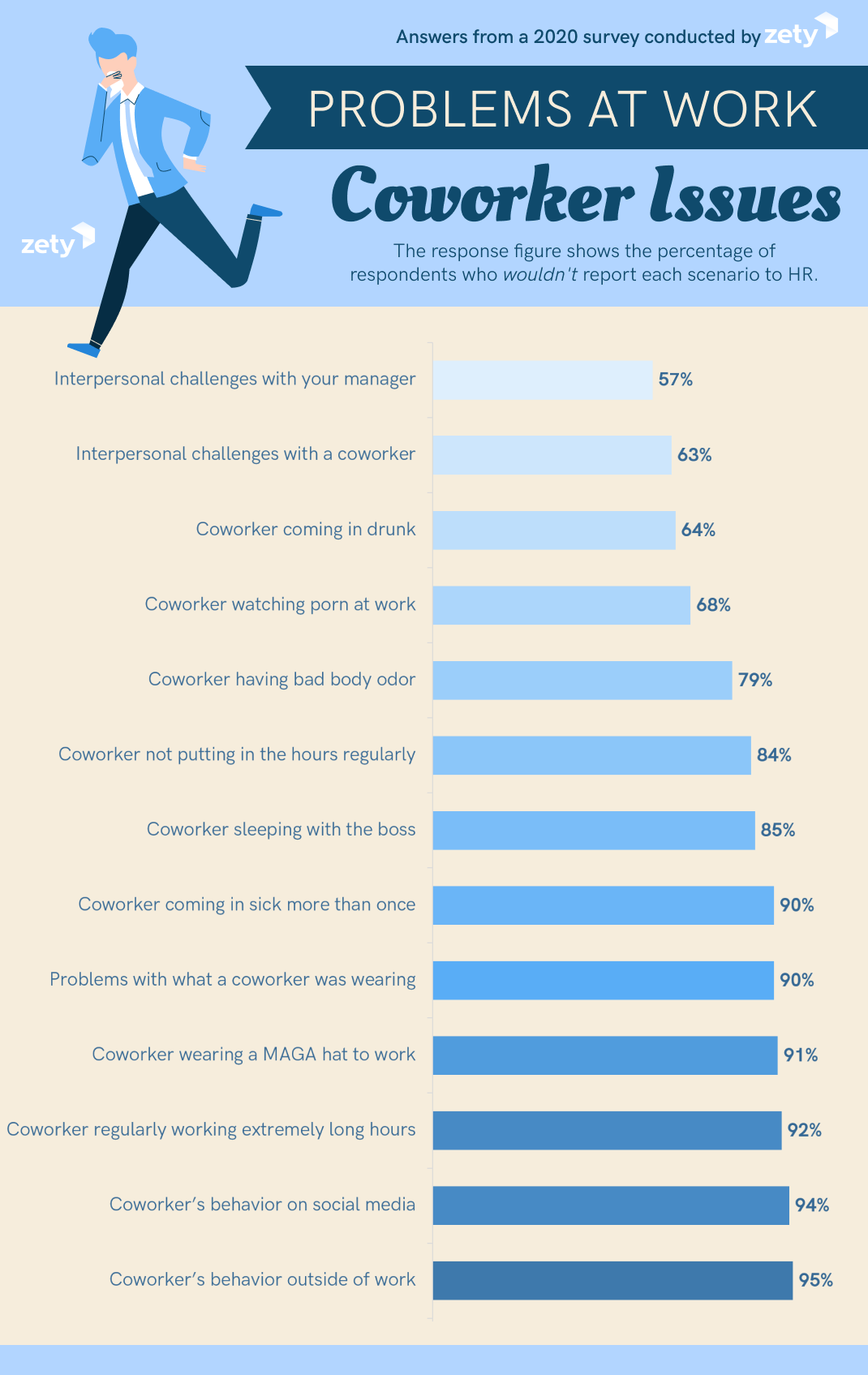
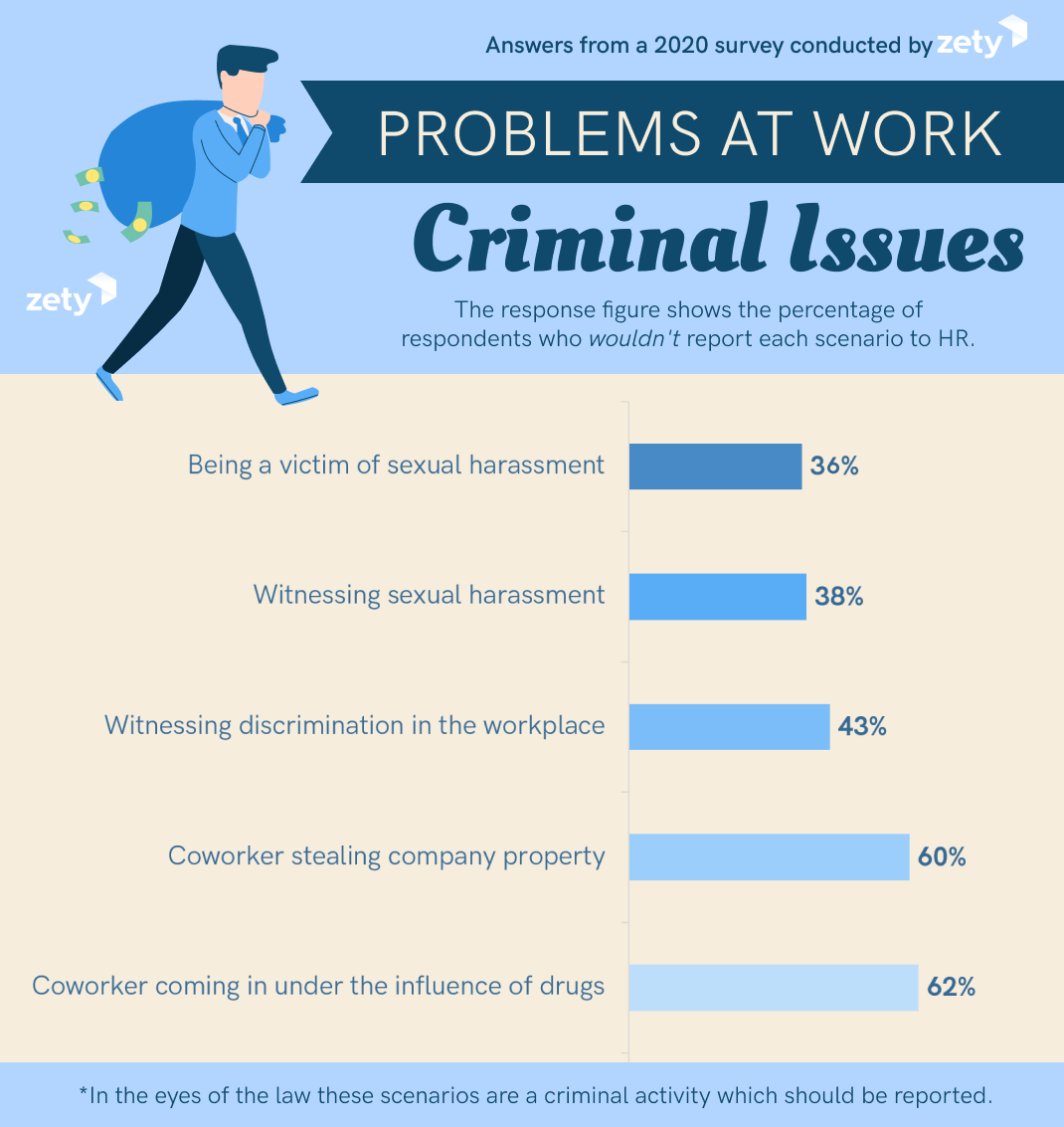
First up, let’s take a more detailed look at the criminal issues. Think about it—
That’s outrageous—this is what HR is for!
The question we’ve then got to ask is—why wouldn’t employees report such situations to HR? HR Acuity’s 2019 Employee Experience Survey provides some insight. The reasons include:
- Fear of retaliation. 46% of the respondents said they feared retaliation if they reported their problems.
- Lack of objectivity. 39% feared their complaint wouldn’t be dealt with fairly.
- Gender. Issues reported by men were 26% more likely to be investigated. Women’s complaints are more likely to be ignored, as evidenced by this comment we received.
“A co-worker had "friended" students at the high school he worked at and he regularly shared pornographic messages on his timeline that were disrespectful to women. I reported it, nothing was done.”
Taking those reasons into consideration it’s completely understandable that many issues don’t get reported. But regardless of whether your HR team is effective or not, reporting harassment and discrimination is a must. Why?
You may not be able to hold the company legally responsible if you don't follow reporting procedures.
So here’s what to do.
- File a complaint. Check your employee handbook and follow the procedure set out. If there’s no procedure, or the person you’re supposed to report to is your harasser, then contact HR and tell them you want to file a grievance.
- Reporting harassment protects your rights. The Supreme Court has set some rules. Once a company has learned about harassment then it’s obliged to take action and legally responsible for any harassment that occurs afterwards.
- Protect yourself from the consequences. After a complaint is filed you can’t legally be fired or demoted just for reporting the problem. Yes, it could still happen, even though it’s illegal, but filing a complaint strengthens any subsequent claim in court.
- Get legal advice. These situations can and do end in the courtroom. An employment lawyer can advise you of the best course of action.
Now let’s take a closer look at the personal issues. Bereavement scored shockingly low with a whopping 87% saying they wouldn't discuss it with HR. In fact, more people would report a coworker wearing a MAGA hat than would report going through a divorce. That’s right, Trump trumps divorce!
Again, this underreporting is understandable. The HR Acuity survey I mentioned previously showed people know where to report issues, but they aren’t comfortable actually reporting them or confident in the processes that follow. Another contributing factor is draconian HR policies.
For example, it’s not uncommon for companies to have policies that demand “proof” of the death in cases of bereavement. It’s a brutal approach that just compounds the grief people are already suffering. Such policies make it less likely people will report bereavement.
And it’s reasonable to assume that the same factors that stop people reporting harassment/discrimination apply to personal issues, too.
But don’t just assume your employer will be so heartless and uncaring. Here’s what you should do in the case of bereavement or personal problems that could affect you at work.
- Do ask about company guidelines. Sadly, there’s no legally mandated leave for bereavement. US law is brutal, compare this to Canada where all employees are entitled to paid bereavement leave once certain eligibility criteria are met. But—
- Many companies do have a more compassionate approach. And if you know a loved one has terminal illness, check this out ASAP so you’re prepared.
- Consider time off under the Family and Medical Leave Act. You may be entitled to 12 weeks unpaid, but job protected leave to cover counselling or health-related issues after a bereavement. If HR won’t help, seek legal advice.
And it’s not just an issue of HR being more human. Personal issues can have a huge effect on mental health and increase anxiety and depression. If they aren’t managed well it translates to a huge loss in productivity.
In fact, the WHO has estimated that depression and anxiety costs the global economy US$ 1 trillion in lost productivity annually. Imagine how much that could be reduced with better support.
Human resources, you’ve got to up your game. Compassion and competence isn’t just important for employees’ well-being, it boosts the bottom line too.
Speaking of bottom lines, next we took a look at situations where workers need to seek advice and assistance from their HR team. There was one issue that stood out head and shoulders above the rest. Here it is.
Money Talks, Advice Walks
When it comes to general advice and assistance the results were striking. Most people will only go to HR when they take a hit to the wallet.
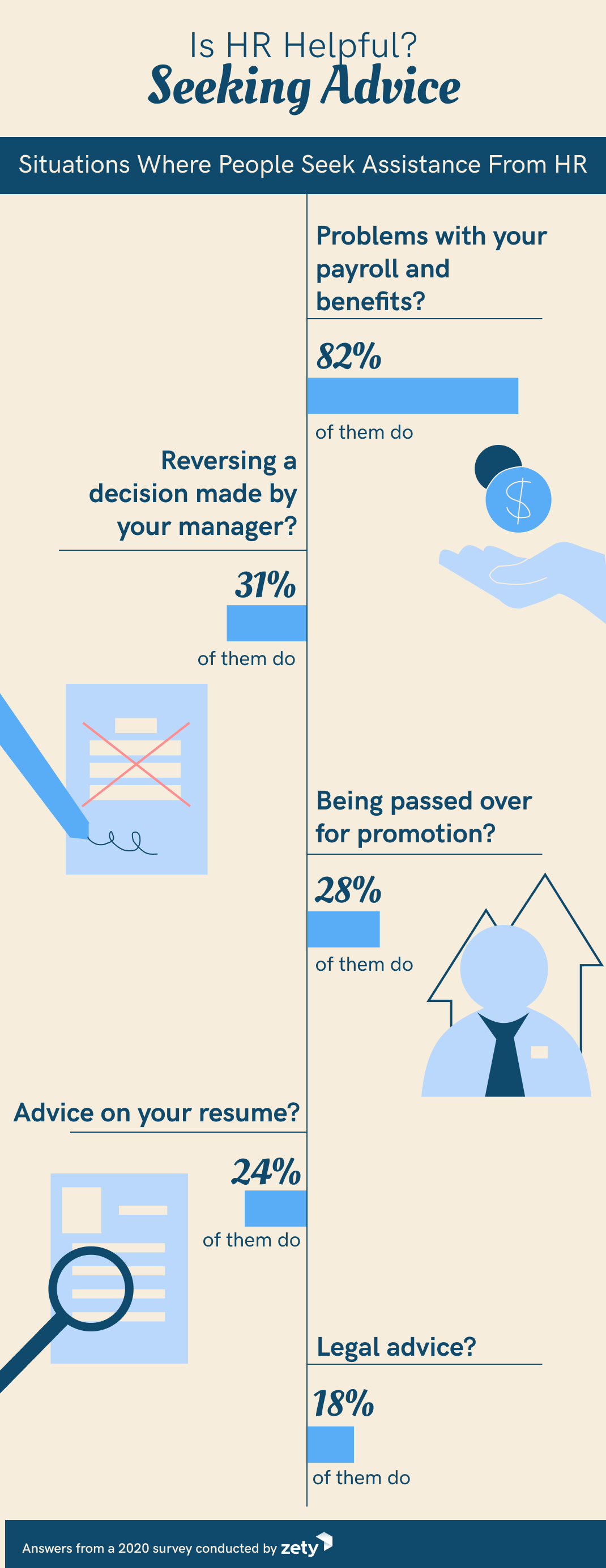
Sadly though, even problems with pay don’t get the care and attention they deserve, as this respondent explained.
“There were a couple of times when I simply did not get paid. HR admitted the error, but wouldn't issue a check and made me wait another two weeks till the next pay cycle.”
So why do problems with payroll and benefits stand out so starkly in these figures? 82% of our respondents would approach HR about this compared to the next most popular response which was only 30%.
This one seems pretty straightforward. People stand up for their paypacket, because they have to. It’s tough out there. But our survey proves there’s little confidence in HR being able to solve other important issues. There’s no trust. If pay disputes are all HR is good for then why not just fire internal HR teams and have an outsourced payroll provider? Tempting, but short-sighted.
That’s because employers need to think of the other side of the equation too. Good practice in HR makes employees more committed. Employees who are more committed are more productive.
And having productive workers who are less likely to make compensation claims for poorly handled workplace issues has a direct effect on the bottom line too. More profit, less operating expenses. It’s a no-brainer.
So how about the real kicker? What do the workers of America really think about their HR colleagues?
Fair Weather Friend
For this section of our survey we took a look at some of the most commonly cited criticisms of HR. Then we formulated these into statements, and asked if workers agreed.
Here’s what we discovered.
|
Statement |
Disagree |
|
HR is trustworthy |
50% |
|
HR is up to date on technology |
43% |
|
HR gets too involved in office politics |
44% |
|
HR is consistent in their decision making |
50% |
|
HR has the info you need readily available |
42% |
|
HR staff lack experience in working with actual humans |
55% |
|
HR focuses on procedures rather than people |
52% |
|
HR provides effective career planning advice |
44% |
|
It's hard to get a straight/timely answer from HR |
60% |
|
HR puts their own department above regular employees |
64% |
|
HR takes the side of the employee |
69% |
|
HR staff lack experience with the business side of things |
66% |
If the preceding data didn’t convince you that HR is far from human then this should. Workers just don’t have any confidence in their HR teams. The most telling statistic is this—
The conclusion is clear, popular opinion still views HR as being unhelpful, inconsistent and hopelessly out of touch.
Just take a look at what this respondent said for a perfect example of the issues that employees face.
“I have never reported any issue to HR because I did not trust them. The lady in charge of HR was a gossiper and I did not want any of my personal issues known to everyone in the company.”
Replicate that sentiment in workplaces across America and it’s clear a huge amount of work needs to be done to turn these figures around.
Ultimately HR needs to live up to its name if it wants to turn its reputation around. They need to start treating their resources as human.
What’s more, it appears that HR professionals know this too. Maintaining employee engagement was cited as the greatest human capital challenge in a survey of HR professionals carried out by the SHRM.
So rank and file employees know something needs to be done. HR professionals know something needs to be done. The system is broken, but what can we do to fix it?
Well here’s a start. Dr. John Sullivan wrote a great piece for TLNT that suggested some actions that need to be taken. Here’s a summary.
- Make the business case for increasing trust. Quantify in dollars the negative business consequences that result from reduced employee trust. Use those figures to change behaviors.
- Become data-driven on employee trust. Use data to identify the best ways to measure employee trust and to identify the specific factors that contribute to it.
- Monitor the media. Hot workplace issues are now discussed in all major media. For example, in the face of the threat from Coronavirus it would make sense to focus on employee concerns about layoffs and remote working. Helping people address their fears is a great trust-building initiative.
- Become more responsive. Employees are almost universally frustrated with what they see as a lack of responsiveness from HR. It’s essential to measure and continually improve the time it takes for HR to respond to employees. It’s also essential to measure satisfaction with responses to ensure that they meet expectations
- Develop effective listening mechanisms. Almost every definition of trust includes the willingness of HR and management to listen. Use data to determine which forums, processes, and mechanisms are viewed by your employees as the best ways for HR to become active listeners.
- Be more proactive in communications. Don’t hide employee impact issues or wait for them to explode. Proactively communicate with your employees using multiple approaches to issues that might concern them.
- Be transparent. Assume that most employees, especially younger ones, have come to expect transparency. And that means HR must provide detailed information on its goals, why rules and policies are necessary, and how HR processes operate.
- Fully explain the role of HR. Start by explaining the role and goals of HR during onboarding. Also, make any HR biases towards management and business results clear, as well as identifying any areas where HR strives to act as a neutral party.
- Help increase productivity. Finally, turn HR into a productivity improvement center. Rather than focusing exclusively on rules and legal compliance, HR professionals should spend more time helping employees and managers be more effective and productive.
Clearly, fixing HR’s broken reputation is going to require a lot of work and real engagement from everyone concerned. But the payoff will be worth the effort. Happier, more productive workers and more profitable businesses.
Last up, let’s talk about the more left-field issues that HR teams face.
The Most Unusual Problems Reported to HR
We had one open-ended question to finish our survey. Just to make sure we didn’t miss anything. So we asked what was the most unusual problem that respondents had to report to HR. The answers speak for themselves.
The Best of the Worst
These were the top 5 problems most reported by our respondents. Please note, we are sensitive to the fact that racism/discrimination is a criminal act and much worse than the other issues here. We have absolutely no intention of downplaying it. This is purely a representation of the answers we received.
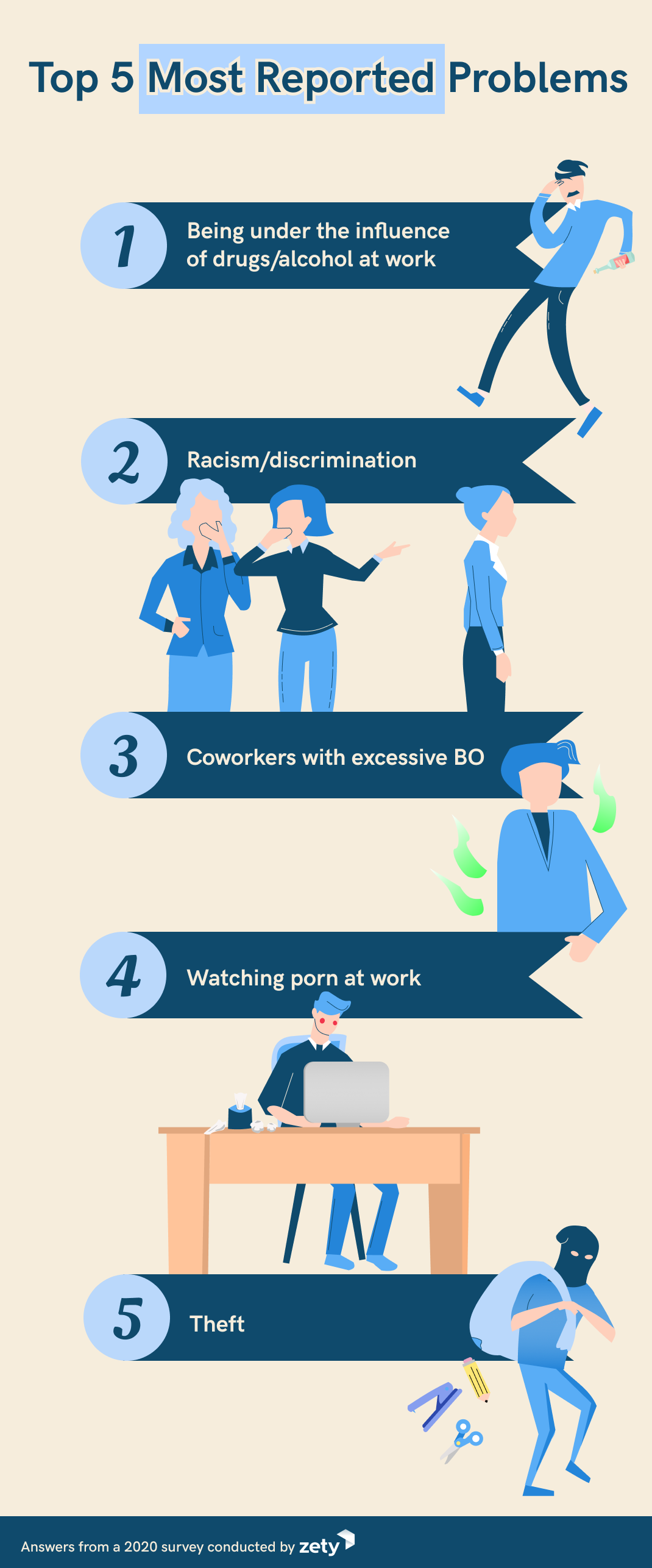
Fun fact: BO was also one of our top office pet peeves. 50% of respondents found it annoying. We’ve got data to back up the drunkenness too. Our survey on office sins revealed 48% of respondents had seen employees under the influence at work.
Rat Surgery, Cat Videos and Twerking in the Trash
And these were the downright weirdest responses. Who said work was boring?
- Changing clothes in other people’s work cubicles.
- Needing to take time off because my girlfriend’s pet rat was having surgery on Valentine’s Day.
- Boss’s dog peeing on the floor of the break room.
- Looking at cat videos.
- Being stalked by a coworker who attempted to murder me.
- Atrociously bad breath.
- Twerking in a trashcan.
Valentine’s day rat surgery. That puts “the dog ate my homework” to shame.
Conclusion
Unfortunately, the criticisms levelled at HR seem to be well-founded. These were the key findings of our survey.
- People lack the confidence to report even the most serious issues at work.
- Very few people would seek advice from HR, only speaking to them when money is at stake.
- There’s a real lack of faith in HR’s objectivity and trustworthiness. And—
- There are some genuinely weird and wonderful workplace issues out there!
But thankfully, there is a way forward. It’ll require hard work and commitment from both sides but ultimately solving HR’s image problems will help employees and employers alike.
Sources
- Survey: 70 Percent of Tech Employees Say HR Is Not Their Friend | Blind Workplace Insights
- John Sullivan, HR, We Have A Problem: Up To 80% Of Employees Don’t Trust Us
- Patrick M. Wright, The impact of HR practices on the performance of business units
- David Cheng & Lu Wang, Examining the Energizing Effects of Humor: The Influence of Humor on Persistence Behavior
- Jessica Gall Myrick, Emotion regulation, procrastination, and watching cat videos online: Who watches Internet cats, why, and to what effect?
- Funeral Leave | U.S. Department of Labor
- Ruth Mayhew, The Average HR Policy for Time Off for Deaths in Family
- Family and Medical Leave Act | U.S. Department of Labor
- 2019 Employee Survey: Issue Reporting | HR Acuity
- Examining the Energizing Effects of Humor: The Influence of Humor on Persistence Behavior
- Michael Tomaszewski, List of 28 Common Office Pet Peeves [Worst of 2021—Survey]
- Bart Turczynski, Worst Office Sins in the American Workplace [2021 Study]
Methodology and Limitations
For this study, we collected answers from 949 American respondents via Amazon's Mechanical Turk. Respondents consisted of 57% females and 43% males. 12% of respondents were 24 or younger, 46% aged 25–38, 29% aged 40–55, and 13% 56 or older.
This self-report study investigated American employees’ opinions about HR and whether they’d report specific situations. Respondents were asked 14 scale-based questions about specific qualities attributed to HR departments.
They were also provided with 26 workplace scenarios and asked to check any that they would report to HR. Respondents were also asked one open-ended question about the most unusual situation they’ve had to report to HR.
As experience is subjective, we understand that some participants and their answers might be affected by recency, attribution, exaggeration, self-selection, non-response or voluntary response bias.
Given the gender and age makeup of our large sample, this study can be generalized to the entire population.
Fair Use Statement:
Have you unearthed some new insights into the way employees interact with HR? You’re welcome to share the results of our study with your audience for any non-commercial use. Just one request, include a link to this page so our contributors can earn credit for their hard work. Thanks for your support.
About Us
With Zety, job applicants can learn to make a resume, pick the best resume format, and find ATS-friendly templates in a matter of minutes. Need to prepare for a job interview? Our experts share 50+ tips to help you ace the interview.
About Zety’s Editorial Process
This article has been reviewed by our editorial team to make sure it follows Zety's editorial guidelines. We’re committed to sharing our expertise and giving you trustworthy career advice tailored to your needs. High-quality content is what brings over 40 million readers to our site every year. But we don't stop there. Our team conducts original research to understand the job market better, and we pride ourselves on being quoted by top universities and prime media outlets from around the world.


![How Human is HR? Beyond Hiring & Firing [2022 Study]](https://cdn-images.zety.com/pages/is-hr-human-ztus-cta-02.webp)